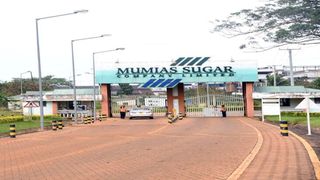
The main gate to Mumias Sugar Company in this picture taken on August 2018.
| File | Nation Media GroupBusiness
Premium
Boilers go silent, workers sent home as hopes of Mumias Sugar Company revival fade away
Plans by a receiver-manager appointed by Kenya Commercial Bank 19 months ago to revive the financially struggling Mumias Sugar Company have yet again run into headwinds.
This is after the miller stopped ethanol production at the factory last month and sent 800 workers home, citing shortage of molasses.
Revival plan
In 2015, the government released Sh3.2 billion to the miller after the former chief executive officer, Mr Errol Johnson, was recruited by the then management board to come up with a revival plan for the cash-strapped miller.
Former Mumias board chairman Kennedy Ngumbau later said an audit would be conducted to establish how the money was spent after the firm failed to kick-start sugar-milling operations.
But the management board left office before the audit promised by Mr Ngumbao was conducted.
According to the sugar task force report handed over to President Uhuru Kenyatta in February last year, Mumias is indebted to the tune of Sh20 billion.
The move by KCB to appoint a receiver-manager to take over operations at Mumias Sugar in September 2019 was part of measures to revive the miller.
The receiver-manager, Mr Ponangipalli Venkata Ramana Rao, took issue with sale of company assets to pay off loans, saying he was focused on reviving the miller with the support of the Kakamega County government.
It was, however, not immediately clear how the perpetual loss maker – which booked a Sh15.1 billion loss in 2018 alone – would raise the Sh3 billion it owes KCB without selling some of its assets.
And now the roar of the boilers and the white smoke that has been billowing from the chimneys, keeping alive hopes of revival, have faded away.
Sugarcane farmers who had pegged their hopes on efforts by the receiver-manager and the county government to revive the miller are disillusioned over the latest developments at the factory.
And management officials at Mumias told nation.africa that plans by Mr Rao to turn around the miller seem to have fallen through the cracks.
Mr Rao is reported to have last visited the factory in March 2020 and is yet to officially communicate on the latest developments at the factory.
Mr Justus Mutobera, a sugarcane farmer in Mumias East constituency, said he had planted 15 acres of cane after the government promised to revive the sugar factory.
“I have made a huge loss after selling the cane to private millers, who were buying a lorry load – which used to fetch Sh30,000 – at Sh6,000. Things have moved from bad to worse and farmers have nowhere to sell the raw material,” said Mr Mutobero.
The miller has been relying on molasses sourced from private sugar factories in the western Kenya region to run the ethanol plant. The main sources have been Butali Sugar Mills, Nzoia Sugar Company and the Busia Sugar Factory.
“We usually ensure that we have a minimum of 3,000 tonnes of molasses before we start ethanol production,” said an employee at the factory, adding that some traders have been buying the raw material and later transporting it to Uganda, where it fetches up to Sh20,000 per tonne, compared to Sh10,000 locally.
Other reports indicate the current interruption could be linked to challenges involving the revenue generated from the sale of more than one million litres of ethanol in the last 19 months, which has been swallowed up by interest payable to one of Mumias’s lenders.
Farmers have continued to cling to promises from the receiver-manager and government officials on plans to revive the miller even as pressure from creditors piled.
Besides debts, other challenges faced by the firm include ageing equipment and cane shortage.
Workers who were affected by the latest disruption of operations at the factory said the miller had sold all the ethanol they had produced.
“We have been away for close to a month now. We have been asked to stay away but there has been no communication on the fate of our jobs,” said one of the affected workers.
Two weeks ago, Kakamega Governor Wycliffe Oparanya visited the factory accompanied by a team from KCB and a man described as a potential investor. They were taken around the factory by the top management before they visited the residential estates and other facilities.
The company’s lawyer Patrick Mutuli said: “My instructions were to take him around the factory to do due diligence and make a decision.”
Details of what was discussed by Governor Oparanya, the KCB team and the potential investor remain sketchy but nation.africa established the Kakamega County chief was involved in the negotiations to identify a strategic partner.
The government promised to act on all the recommendations made by the task force formed to focus on reviving the troubled sector, but the findings of the report are yet to be implemented.
The task force recommended reintroduction of a levy to be charged on consumers to raise the revenue needed to assist cane farmers develop the crop, among other issues.
The county government is involved in a plan to advance loans to farmers in the Mumias Sugar catchment to ensure adequate raw material is available once the factory resumes operations.
The loans will be advanced through an outgrower firm in the form of seed cane, ploughing and furrowing services as well as other inputs.
Private sugar millers have been competing for available mature cane, leading to conflicts and shortage of raw material for the region’s factories.




